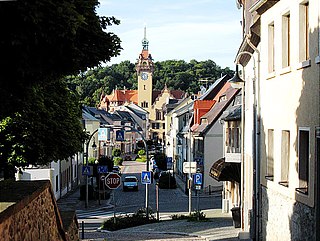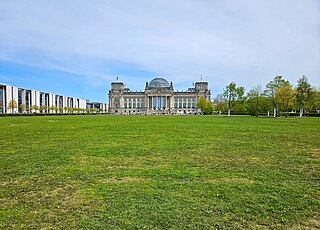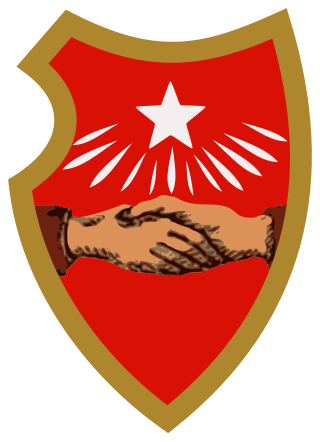
Gustav Alfred Julius Meyer was a Nazi Party official and politician. He joined the Nazi Party in 1928 and was the Gauleiter of North Westphalia from 1931 to 1945, the Oberpräsident of the Province of Westphalia from 1938 to 1945 and the Reichsstatthalter of Lippe and Schaumburg-Lippe from 1933 to 1945. In 1941 he became the Permanent Deputy to the Reichsminister of the Reich Ministry for the Occupied Eastern Territories. He represented the ministry with Georg Leibbrandt in the January 1942 Wannsee Conference, at which the genocidal Final Solution to the Jewish Question was planned. Near the end of World War II in Europe, Meyer committed suicide in April 1945.

The Reichstag, a historic legislative government building on Platz der Republik in Berlin, is the seat of the German Bundestag. It is also the meeting place of the Federal Convention, which elects the President of Germany.

The Enabling Act of 1933, officially titled Gesetz zur Behebung der Not von Volk und Reich, was a law that gave the German Cabinet – most importantly, the Chancellor – the power to make and enforce laws without the involvement of the Reichstag or Weimar President Paul von Hindenburg, leading to the rise of Nazi Germany. Critically, the Enabling Act allowed the Chancellor to bypass the system of checks and balances in the government.

Georg Michaelis was the chancellor of the German Empire for a few months in 1917. He was the first chancellor not of noble birth to hold the office. With an economic background in business, Michaelis' main achievement was to encourage the ruling classes to open peace talks with Russia. Contemplating that the end of the war was near, he encouraged infrastructure development to facilitate recovery at war's end through the media of Mitteleuropa. A somewhat humourless character, known for process engineering, Michaelis was faced with insurmountable problems of logistics and supply in his brief period as chancellor.

The Constitution of the German Reich, usually known as the Weimar Constitution, was the constitution that governed Germany during the Weimar Republic era (1919–1933). The constitution declared Germany to be a democratic parliamentary republic with a legislature elected under proportional representation. Universal suffrage was established, with a minimum voting age of 20. The constitution technically remained in effect throughout the Nazi era from 1933 to 1945 as well as during the Allied occupation of Germany from 1945 to 1949, though practically it had been repealed by the Enabling Act of 1933 and thus its various provisions and protections went unenforced for the duration of Nazi rule, and after World War II, the power of the Allied Control Council and four occupying powers once again stood above the provisions of the constitution.

Bernhard Rust was Minister of Science, Education and National Culture (Reichserziehungsminister) in Nazi Germany. A combination of school administrator and zealous Nazi, he issued decrees, often bizarre, at every level of the German educational system to immerse German youth in Nazi ideology. He also served as the party Gauleiter in Hanover and Brunswick from 1925 to 1940.

Paul Gustav Emil Löbe was a German politician of the Social Democratic Party of Germany (SPD), a member and president of the Reichstag of the Weimar Republic, and member of the Bundestag of West Germany. He died in Bonn in 1967.

Georg Schumann was a German communist and resistance fighter against the Nazi regime.
František Xaver Dušek ; 8 December 1731 – 12 February 1799) was a Czech composer and one of the most important harpsichordists and pianists of his time.

The Thomanerchor is a boys' choir in Leipzig, Germany. The choir was founded in 1212. The choir comprises about 90 boys from 9 to 18 years of age. The members, called Thomaner, reside in a boarding school, the Thomasalumnat and attend the St. Thomas School, Leipzig, a Gymnasium school with a linguistic profile and a focus on musical education. The younger members attend the primary school Grundschule Forum Thomanum or Anna-Magdalena-Bach-Schule. Johann Sebastian Bach served as Thomaskantor, director of the choir and church music in Leipzig, from 1723 to 1750.

Waldheim is a town in Mittelsachsen district, in Saxony, Germany.

Der Angriff was the official newspaper of the Berlin Gau of the Nazi Party. Founded in 1927, the last edition of the newspaper was published on 24 April 1945.

This is a list of members of the 4th Reichstag – the parliament of the Weimar Republic, whose members were elected in the 1928 federal election and served in office from 1928 until its dissolution in 1930.

Raising a Flag over the Reichstag is a World War II photograph, taken during the Battle of Berlin on 2 May 1945. It depicts a Soviet soldier raising the flag of the Soviet Union over the Reichstag. The photograph was reprinted in thousands of publications and came to be regarded around the world as one of the most significant and recognizable images of World War II. Owing to the secrecy of Soviet media, the identities of the men in the picture were often disputed, as was that of the photographer, Yevgeny Khaldei. It became a symbol of the Soviet victory over Nazi Germany.
Events from the year 1881 in Germany.

The Reichstag, officially the Greater German Reichstag after 1938, was the national parliament of Nazi Germany from 1933 to 1945. Following the Nazi seizure of power and the enactment of the Enabling Act of 1933, it functioned purely as a rubber stamp for the actions of Adolf Hitler's dictatorship — always by unanimous consent — and as a forum to listen to Hitler's speeches. In this purely ceremonial role, the Reichstag convened only 20 times, the last on 26 April 1942. The President of the Reichstag throughout this period was Hermann Göring.

Platz der Republik is a square in Berlin, Germany. It is located in the Tiergarten, directly in front (west) of the Reichstag building. The square has an area of about 36,900 square meters and is almost completely covered by grass but is decorated with some hedges and a few trees.
Altner is a surname. Notable people with the surname include:

The Independent Social Democratic Party of Germany was a short-lived political party in Germany during the German Empire and the Weimar Republic. The organization was established in 1917 as the result of a split of anti-war members of the Social Democratic Party of Germany (SPD), from the left of the party as well as the centre and the right. The organization attempted to chart a course between electorally oriented reformism on the one hand and Bolshevist revolutionism on the other. After several splits and mergers, the last part of the organization was terminated in 1931 through merger with the Socialist Workers' Party of Germany (SAPD).

Ludwig Theodor Ferdinand Max Wallraf was a German politician who served as mayor of Cologne from 1907 to 1917. He was State Minister of the Interior from 1917 to 1918. As a German National People's Party politician, he was a member of the Reichstag from 1924 to 1930 and briefly served as its President in 1924/25.

















